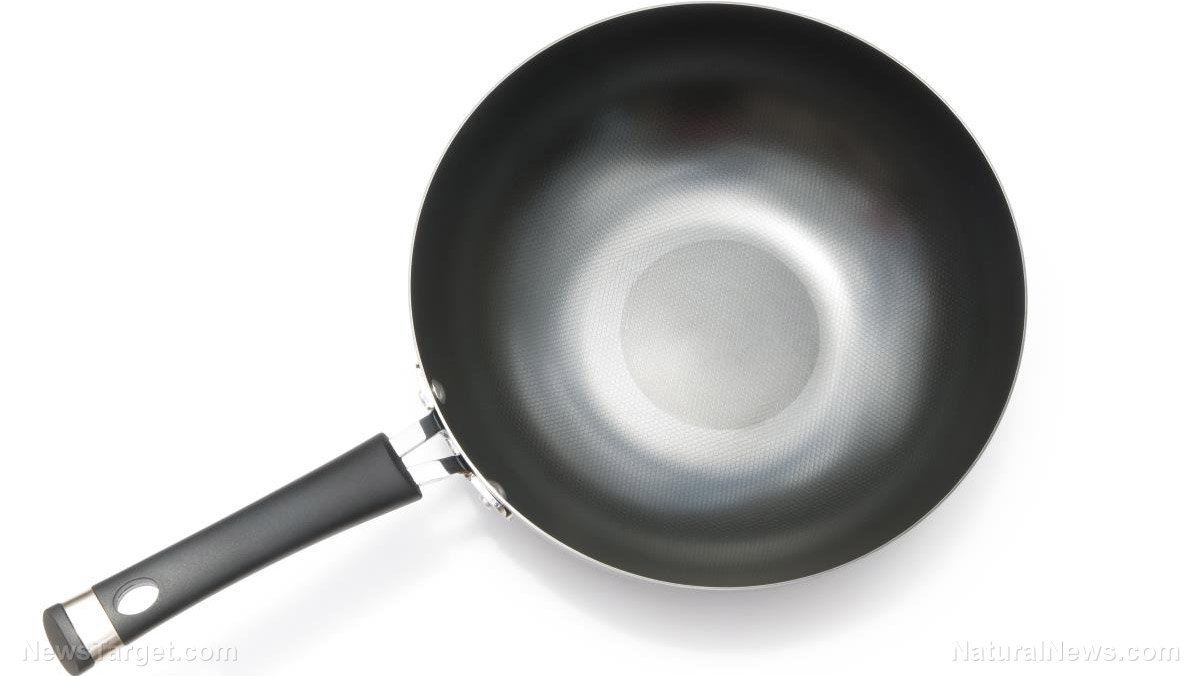Dump dangerous pots and pans laced with cancer-causing chemicals for these non-toxic alternatives
04/14/2017 / By Amy Goodrich

Nonstick pans and pots are the world’s most favorite cookware. They are easy to clean and don’t require a lot of oil to grease their surface. Many Americans, however, are unaware of the toxic dangers lurking in these nonstick coatings.
If you are already buying fresh, organic ingredients free of GMOs and chemicals, but are still using nonstick cookware, all attempts to limit health-damaging chemicals by buying organic foods are completely futile. Most cookware used today leach toxins right into the food serve our families daily.
Nonstick pots and pans are made of poly- and perfluoroalkyl substances (PFAS). When these compounds are heated, they release perfluorooctanoic acid (PFOA), a carcinogenic chemical, into the food. Furthermore, many of the cheaper pots and pans are made of aluminum. Compared to other metals, aluminum is a relatively soft metal that can easily flake off and contaminate food when heated.
Mounting evidence exists that aluminum in food, water, and vaccines is a major contributing factor in the increase of Alzheimer’s disease. Additionally, it has also been proven to damage the central nervous system (CNS) and in children, resulting in conditions like memory impairments, autism, epilepsy, mental retardation, and dementia.
Instead of rolling the dice and risking any of these terrible conditions, opt for safer cookware instead. While they come with a hefty price tag, they are worth the investment to protect your family’s health. While old-fashioned cast-iron cookware is one of the safest cooking options available, below you’ll find six other safe, non-toxic, and eco-conscious alternatives to the favorite, toxic Teflon (also known as polytetrafluoroethylene or PTFE) pans.

1. GreenPan
This higher-end Belgian brand makes non-stick, non-toxic cookware coated with Thermolon. Thermolon is a ceramic layer made from sand. Unlike other nonstick pans, GreenPans are free from lead, cadmium, PFASs, or PFOAs and can withstand high temperatures of up to 450°C or 840°F. Given this high temperature, the pans won’t blister or release toxic fumes or chemicals when overheated.
Furthermore, the company is doing everything within their power to make the production process as green as possible, releasing 60 percent less CO2 compared to other companies who use traditional coating materials.
Since the company has been making its eco-friendly pans for ten years, it has continually been improving the nonstick surface. If you are planning to buy a GreenPan, Organic Authority recommends buying its most advanced fifth generation pans.
2. Beka Eco-Logic
Another great line of eco-friendly and safe cookware is Beka Eco-Logic. The company offers a broad range of non-toxic, environmentally friendly cookware, including skillets, frying pans, woks, ladles, skimmers, spatulas, and colanders. They are made of bamboo powder and other natural, biodegradable materials.
3. BioChef
BioChef produces high-quality, eco-friendly cookware made from bioplastic. Unlike the plastic we know, these hard materials are derived from renewable biomass from corn, sugar, or algae. To make their company even more eco-friendly, BioChef recycles these materials from foods that would usually end up in landfills.
4. Mauviel
Copper-based cookware made by Mauviel, a French brand loved by many professional chefs, has been around since the 1830s. Mauviel’s affordable M’Stone line consists of pans coated with a non-stick ceramic layer free of PFOAs and PTFEs.
5. Ozeri Green Earth
For its lime green Green Earth pans, Ozeri uses a German nonstick, PFOA- and PTFE-free ceramic coating called Greblon. Its innovative honeycomb textured cooking surface is scratch and heat resistant, and entirely safe to use on gas, electric, or induction stoves.
6. Ecopan
These durable, stainless steel pans will not dent or warp and are free of PTFEs and PFOAs. Furthermore, their nonstick ceramic coating is extremely heat resistant to prevent blistering and toxic fumes.
Find more information about toxins in our food and water supply at Toxins.news.
Sources include:
Submit a correction >>
Tagged Under:
Aluminum, cancer, cancer-causing, cookware, ecofriendly, nonstick, nonstick pan, nontoxic, PFAS, PFOA, Teflon, toxins
This article may contain statements that reflect the opinion of the author




















